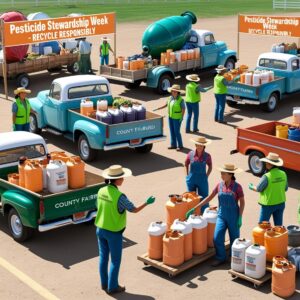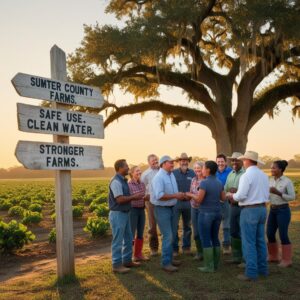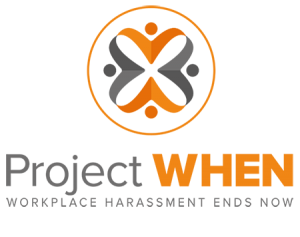From Compliance to Commitment: How Communication Reframed Pesticide Safety in Sumter County, Georgia
 In 2017, Sumter County, Georgia, launched a targeted initiative to address a critical but often overlooked component of agricultural sustainability: pesticide safety. The Ag Pesticide Stewardship Week, a collaboration between the Sumter County Extension Office and the Georgia Department of Agriculture, focused on promoting responsible pesticide use and disposal among farmers and applicators. Through education, recycling programs, and certification, the initiative aimed to reduce environmental contamination and ensure compliance with state regulations.
In 2017, Sumter County, Georgia, launched a targeted initiative to address a critical but often overlooked component of agricultural sustainability: pesticide safety. The Ag Pesticide Stewardship Week, a collaboration between the Sumter County Extension Office and the Georgia Department of Agriculture, focused on promoting responsible pesticide use and disposal among farmers and applicators. Through education, recycling programs, and certification, the initiative aimed to reduce environmental contamination and ensure compliance with state regulations.
This case study examines how this community-based program created a lasting culture of environmental stewardship by combining regulatory alignment, local outreach, and accessible services. The Sumter County model offers a roadmap for other agricultural communities seeking to address pesticide management in a sustainable, community-centered way.
The Initiative: Structure, Mission, and Governance
Ag Pesticide Stewardship Week was jointly administered by the Sumter County Extension Office and the Georgia Department of Agriculture, with support from private-sector partner Eco Ag, Inc., and guidance from the Ag Container Recycling Council.
Its mission was clear:
- Promote safe and legal pesticide practices to protect the environment and public health.
- Support regulatory compliance through hands-on education and training.
- Provide accessible recycling options for agricultural communities.
The initiative was structured around three main components: mobile pesticide container collection events, educational outreach on proper pesticide use, and certification workshops for applicators. These efforts were grounded in the guidelines set by the Official Code of Georgia Annotated (O.C.G.A.) Title 2, Chapter 1, and aligned with broader state and federal environmental protection standards.
A Communication-Centered Approach to Bridging Gaps
A defining characteristic of Ag Pesticide Stewardship Week was its deliberate shift away from compliance-heavy communication. Instead of issuing directives from afar, the campaign built a locally-rooted, multi-modal strategy to ensure the messages were accessible, timely, and responsive to the community’s needs.
Communication was not simply a delivery mechanism—it was the vehicle of transformation. The initiative’s success hinged on how well it could translate regulations into meaningful action through clear, compassionate, and culturally aware dialogue.
Mobile Collection Days
At the centerpiece of the campaign was the annual Mobile Collection Days, which invited farmers to drop off triple-rinsed pesticide containers for proper recycling. These events were hosted at familiar agricultural locations and were scheduled in coordination with the county’s planting and harvesting calendars, ensuring that participation was convenient rather than disruptive.
Key logistical features included:
- Eligibility Criteria: Only certain plastic types and container sizes were accepted, and containers had to meet standards for cleanliness and preparation.
- Support from Eco Ag, Inc.: The company provided pickup and recycling services free of charge, thanks to sponsorship from the Ag Container Recycling Council.
- Alternative Options: For farmers who couldn’t attend the events, the initiative offered online pickup requests through Eco Ag’s portal—an effort to reduce participation barriers and increase accessibility.
The real innovation here was not just in logistics, but in messaging. These events were framed not as enforcement actions but as opportunities for farmers to protect their land, demonstrate professionalism, and contribute to community well-being.
Educational Outreach
The Extension Office launched a robust educational campaign that extended beyond flyers or one-off trainings. It was rooted in the principle of ongoing engagement—a process that combined factual knowledge with behavioral reinforcement.
Tactics included:
- Printed materials with diagrams and step-by-step guidance on safe storage, transportation, handling, and disposal of pesticides.
- On-farm visits where extension agents could assess storage practices, clarify questions, and build relationships.
- Workshops and small-group sessions that incorporated updates to Georgia’s pesticide laws and regulations, as well as case examples of real-world incidents to underscore environmental risks.
Crucially, these materials were not written in bureaucratic or overly technical language. Instead, they reflected the realities of local farming—pulling in real concerns, using plain English, and involving farmers in the design of messaging. The tone was respectful, the pacing realistic, and the communication two-way.
Why It Works
Communication was rooted in trusted sources and local relevance. By meeting farmers where they are—through on-farm visits, mobile services, and plain-language materials—the program fostered a sense of partnership rather than enforcement. The integration of online tools like the Eco Ag pickup request portal extended the program’s reach while maintaining accessibility.
Modeling Participatory Governance Through Agricultural Voice
Though not a formal board or advisory body, Ag Pesticide Stewardship Week modeled participatory governance through its responsive, collaborative design. Local farmers didn’t just receive information—they shaped how it was delivered.
Feedback-Informed Programming
Extension agents actively solicited feedback from farmers and applicators, adapting the format, timing, and messaging of events to suit agricultural schedules. For instance, collection days were coordinated with peak planting and harvest calendars to maximize participation. Certification sessions included practical examples drawn from local experiences, ensuring sessions were useful—not abstract.
Emphasis on Voluntary Compliance
Rather than punitive enforcement, the program emphasized the shared responsibility of environmental stewardship. Certification workshops framed regulation as a tool for protecting soil, water, and health—not just a legal hurdle. This framing fostered genuine buy-in from farmers, many of whom became advocates for responsible pesticide practices among their peers.
Why It Works
The program worked because it prioritized relationship-building and cultural relevance. By showing respect for farmers’ time, knowledge, and constraints, the campaign built credibility. This relational approach turned compliance into collaboration, enabling a cultural shift toward sustainable pesticide use.
Impact and Replication of the Stewardship Week Model
Over its five-year span, Ag Pesticide Stewardship Week generated tangible environmental and community outcomes:
- Environmental Protection: By promoting recycling of properly rinsed containers and educating on safe use, the program helped prevent chemical leaching into soil and water sources.
- Increased Regulatory Compliance: Hundreds of local farmers and applicators participated in workshops that clarified state laws and improved safety practices.
- Community Responsibility: The initiative cultivated a visible culture of stewardship in Sumter County. Farmers saw themselves not only as producers, but also as caretakers of the land and water.
The program is now being referenced in neighboring counties as a model for pesticide management outreach. Its success has led to ongoing partnerships between the Georgia Department of Agriculture and local extension offices to scale up similar programs across rural Georgia.
 Communication Lessons from Sumter County
Communication Lessons from Sumter County
The Ag Pesticide Stewardship Week offers several important communication takeaways for government agencies and agricultural partners:
- Trusted messengers matter: Local extension agents were central to the program’s success. Farmers were more responsive to peers and local advisors than distant regulatory bodies.
- Simple actions build momentum: Recycling containers may seem like a small step, but it opened the door to deeper conversations about sustainable farming.
- Participation must be easy: From online pickup requests to on-site events, the program removed logistical barriers that often prevent engagement.
- Respect leads to results: Framing farmers as partners rather than violators shifted the tone of the conversation—and increased voluntary compliance.
Conclusion
The Ag Pesticide Stewardship Week in Sumter County, Georgia, illustrates how well-crafted local programs can move the needle on environmental protection and agricultural sustainability. Through mobile services, outreach, and accessible certification, the initiative built a framework where regulatory compliance and community values aligned.
At its heart, the campaign was about more than recycling containers—it was about cultivating a culture of shared responsibility. As other rural communities face similar challenges around pesticide use and environmental risk, the Sumter County model offers a proven, replicable blueprint for action.
By blending policy, communication, and community, the Ag Pesticide Stewardship Week didn’t just change practices—it changed mindsets.
Ready to Elevate Your Agency’s Public Communication?
We understand the unique challenges state and local government agencies face—from complex issues to diverse community needs. Our comprehensive approach can help you transform the way you connect with constituents, improve transparency, and highlight the valuable work your agency does every day.
Interested in learning more? Reach out to us today for a consultation. We’d love to discuss how our services can support your goals and help you build lasting trust with the communities you serve.



 Communication Lessons from Sumter County
Communication Lessons from Sumter County

